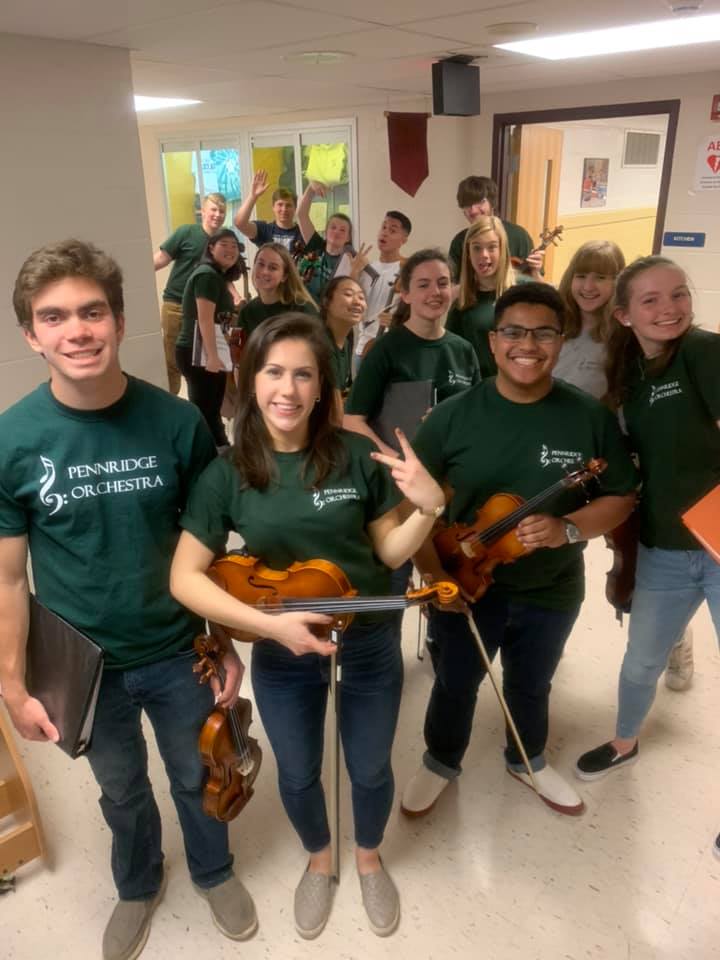 “The greatest use of a life is to spend it for something that will outlast it.” – William James
“The greatest use of a life is to spend it for something that will outlast it.” – William James
Being a first year teacher is hard. There’s a lot to think about and often too little time to prepare. You’ll meet more people and learn more names than you can possibly remember. And, most likely, get lost in your school at least once. If you’re moving to a new area or state, that’s a whole new layer to consider and figure out. The first year is exhausting—the chances of you feeling 100% ready-to-go are slim.
I’ve been a new teacher 3 times. In fact, I’ve never not been a new teacher. I’ve moved to new states, learned new state standards and evaluation processes. I’ve moved back home where I learned to acquaint myself with the community and expectations. One thing that never changes, though, is the challenge of starting a new job.
This blog post will not have all the answers—there’s not enough room on the internet for all of tips and tricks you’ll pick up this year. This post is just some advice that I’ve picked up along the way, as a young music teacher trying to find their home in a crazy profession. Hopefully, you can use some of what I’ve learned to avoid mistakes or make your transition easier. However, every situation is different. So, if you find that something doesn’t work for you, that’s ok! Find out what does work for you and your school, adjust, and make improvements!
You’ll notice that I don’t tell you how to choose music, arrange your classroom, what to program for the winter concert, or give you ‘10 awesome teaching hacks!’. Those are all decisions you need to make based upon your situation, your students, and your resources. What I can offer you are broad observations that I have applied to all of my teaching experiences thus far.
Nobody is perfect and you’re going to make mistakes. There is no way you could possibly know about all of the inner workings and relationships that your school has established before you arrived.
“You don’t have to be great to start, but you have to start to be great”- Zig Ziglar
Let’s just get this out of the way from the start: nobody is perfect and you’re going to make mistakes. There is no way you could possibly know about all of the inner workings and relationships that your school has established before you arrived. You might accidentally upset someone or say something that doesn’t go over that well. That’s okay. You might put scotch tape on the wall when the custodians expect you to use painters tape. That’s okay. The list of mistakes you will inevitably make is long. They might be small mistakes, they might be big mistakes. However don’t let this get you down. Seasoned teachers make mistakes, principals make mistakes, superintendents make mistakes—everyone makes mistakes. Your first year is your time to make a million mistakes. Ask for help—there is no shame in admitting you don’t know something or need assistance. It’s going to be harder some days than others. Keep going. You won’t regret it.
Ask yourself “what will be best for the kids?” Not best for the teachers. Not for ease.

Marissa’s Pennridge orchestra students
Secondly, remember that you are doing your job for the kids. I often tell people that if I wanted to just make money, I would have gone into science or business, worked my 9-5, and then gone home and shut my job off. But I chose to go into a profession that requires hours long after the work day is over and pays far less than our efforts. I love every single moment of it. However, it’s easy to get caught up in office politics, teacher lunchroom drama, or be dragged down by teachers who wish they were somewhere else. Don’t let these things bog you down. On the days that the one noodge in your class just won’t stop pressing your buttons, reground yourself and remind yourself why you’re in front of the class.
This is also useful advice for decision making. If you’re ever faced with a decision about grades, a policy change, or are in a heated discussion with a colleague or administrator, ask yourself “What will be best for the kids?” Not best for the teachers. Not for ease. Simply, “What is best for the kids?”. This is a piece of advice I picked up from my grandfather, a former teacher, principal, and superintendent. It’s a simple concept and a simple question that has helped me solve hundreds of tough decisions in my short time as a teacher. This should seem like a no-brainer but often is not. So, even on those days when no one else seems to remember, always do your job for the kids.
“Kind words do not cost much. Yet they accomplish much.” -Blaise Pascal
Of the hundreds of people you will meet as a new teacher, it is important that you are very aware of a few individuals. You will have to work with department chairs, curriculum directors, and administrators. But, the people you need to treat like celebrities are the secretaries and custodians. I promise you they are some of the hardest working people in your building(s) and are too often taken for granted. They will be some of the first people you come in contact with and will be instrumental in getting you set up in your new school. They will do everything from answering your small, first-year questions, to helping you move furniture because you don’t like the way the old music teacher had the room arranged. These people are the backbone of your school. Get to know your secretaries and custodians, treat them well, and thank them often.
Sometimes, a disagreement can feel like a personal attack when in reality, it is just a passionately formed opinion from your colleague.
Along similar lines, you might not agree with everything all of your colleagues say. It is rare that you walk into a department that does everything the way you like and believe everything that you do. I encourage you to digest what is being said to you before forming opinions or responding. Generally, people say and implement things based on a belief system. Even if you do not agree with them, try to see it from their point of view so you can understand why they are making certain decisions. This will help you calmly converse about disagreements or issues that may arise. Sometimes, a disagreement can feel like a personal attack when in reality, it is just a passionately formed opinion from your colleague. You are allowed to listen and reflect for a substantial amount of time before responding. This will help you to form healthy working relationships with your colleagues. This is advice that I would keep in mind when responding to parents, particularly angry ones, as well.
“The greatness of a community is most accurately measured by the compassionate actions of its members.” – Coretta Scott King
The key to a successful first year, in my experience, is learning everything you can about the community. The more I learned about the students I was teaching, the parents they go home to, and the values of the larger population, the better off I was as a teacher. It is important to not only learn about the community around you but realize your position in the community. A school music program is often an important cog in the school’s works; and the director at the head of it even more coveted. There are a few separate cultures you need to learn about in your community:
- your classroom
- your school
- your town.
It is important to not only learn about the community around you but realize your position in the community.
In each of these situations ask yourself: “What can I do to better the people of these communities?” and then “How do I do this?”. Some very small, but practical things you can do to learn about your community are listed below.
- Read! Check out the school website or township/city website for demographics. Sometimes book stores will carry small books about the area’s history, too!
- Go to as many school events as possible—any athletic event, other concerts in your district, art shows, and beyond, are fantastic ways to meet people including your
colleagues. - Support your students outside of the music classroom. Do you have a trumpet player who’s also the basketball point guard? Go cheer them on for a half. A flautist who is an
amazing painter? Go see them at the art show! Don’t forget that Vo-tech students often have shows to display their work annually!
Bonus points: get a group of your music students to go with you to cheer at games, make signs, and support their fellow musicians. - Talk to everyone and anyone! The locals are the best way to learn about their home.
“Only those who will risk going too far can possibly find out how far it is possible to go.” – T.S. Eliot
I guarantee you’ve heard this a million times: “Do not change anything your first year”. I cannot tell you how much I disagree with that statement. Should you go in and do a complete program overhaul without building rapport or gaining support and trust? No, of course not. But to go to your new program and change nothing is a lost opportunity in my opinion. Change, for anyone, is scary and it’s important to remember that as you take over a position in a music program. However, you’re a new person with new ideas. Naturally, people will expect some changes. If you change too much, you might get pushback. In fact, you might get pushback if you change anything. That doesn’t mean you shouldn’t try to do what you feel is best for your kids. When trying to make change, make sure your logic is fully thought out. Make sure you can explain it to your administrators and parents. If there is literature (articles, research, books, etc.) supporting your new ideas, that’s even better. Make smart decisions that are in the best interest of your students and the program, not just because you want to.
you might get pushback if you change anything. That doesn’t mean you shouldn’t try to do what you feel is best for your students.
This may feel contrary to what I just said but stick with me…. Be a risk-taker teacher. Be an innovative teacher. Question norms and traditions (with respect). Try new things. Fail at trying new things. Adjust and retry new things. Perfect new things. Your kids only get the experience and education that you choose to give them. If all you do is run a large ensemble rehearsal where the students are silent and listening to you, that’s the only experience they will have. It’s important that you find out or decide what you should be teaching your students and then figure out the most innovative and exciting ways to teach the content to them. Even if your community only expects polished concerts, remember that you are responsible to be teaching them as much about music as possible. This includes creating music, actively listening and engaging with music, experiencing new musical cultures, being able to intelligently discuss music, learning the historical and political influences on music, and so much more. This does not mean your students should be able to do a full blown theory analysis as they listen to a Beethoven symphony for the first time (although that would be cool). You are going to have to make tough decisions about what you teach your students because you can’t teach it all. Choose things that will be useful, things that will stick with them, and things that will allow them to keep engaging with music long after they leave your classroom.
“Anyone who stops learning is old, whether at twenty or eighty.” – Henry Ford

Marissa with some of her music students
The day you stop learning is the day you are in danger of becoming an ineffective teacher. While your first year is going to be crazy, overwhelming, and difficult, it is important that you remember that you need to keep learning to better yourself. If you think you don’t have time for that educational book you’ve been meaning to read or time to attend a grad class or conference; try your hardest to reevaluate your schedule. Because, chances are, you can fit it in somewhere. Read a few pages every day, find online learning seminars to attend, log into twitter chats, or just have a conversation with your teacher friends in other schools.
The day you stop learning is the day you are in danger of becoming an ineffective teacher.
This is how you gather new ideas to add to your classroom. Professional social media is your friend. Your college classmates and professors are rich resources. MEA or NAfME conferences are important for networking and gaining new connections to people and their ideas. Soak it all in. Log all of your resources, keep a list of things you want to try or people you want to work with. Even if you don’t get to it this year, next year, or in five years, there may be a day when you want to switch things up and then you will have a huge self made resource of ideas to try!
“An empty lantern provides no light” – Unknown
If you’ve read this entire blog post, you know that I just finished telling you that your first year is going to be crazy. In addition to the duties of your job, I advised you to attend extra events in your school and continue to be an active learner. How in the world does anyone have time for that? Well, here’s another thing you should fit in: self care. You cannot be the best teacher version of yourself if you are not caring for yourself. Make sure you take time to relax, have a few minutes of silence, or fit in a quick run. Do things for physical and mental well being and not out of peer pressure or obligation. There will be moments when you are in survival mode and your version of self care is a 20 minute nap on a Saturday afternoon.
There are times when you need to put a stop to your work and recharge so that you are able to give the best version of yourself to your students.
There will be other moments when you might find you have some extra time at other points in the year where you can get away for the weekend with friends or family. However you can find the time, it’s important that you take care of yourself so you do not experience burn out. We see teachers burn out all the time after tirelessly giving themselves 110% to their profession. There are times when you need to put a stop to your work and recharge so that you are able to give the best version of yourself to your students. No one will fault you for taking time to enjoy your life, see your family and friends, and relax. Work your absolute hardest but don’t forget that “an empty lantern provides no light”.
For all of the new teachers out there- good luck! It will be a rollercoaster year but in the end, I promise it will be worth it. If you have questions or wish to continue this conversation, please do not hesitate to reach out to me at [email protected] at any time!




[…] This article first appeared on the F-flat Magazine blog. […]
I’m currently a music education student in school and when I came across this article, I immediately clicked on it. I want to be extra prepared for when I finally am teaching my own classroom. This article definitely covered a lot, but I think what I most appreciated was what was said about making changes. Guarriello was right when she said that I probably have been told to not make any changes my first year, but that never really reasonated with me. What if I come into a program that is “stuck in the old ways” and is not being effective in educating the students? I think it is important to make changes for the benefit of the students. It is just important to make sure that you are being respectful of the community around you. Thank you for this wonderful article!